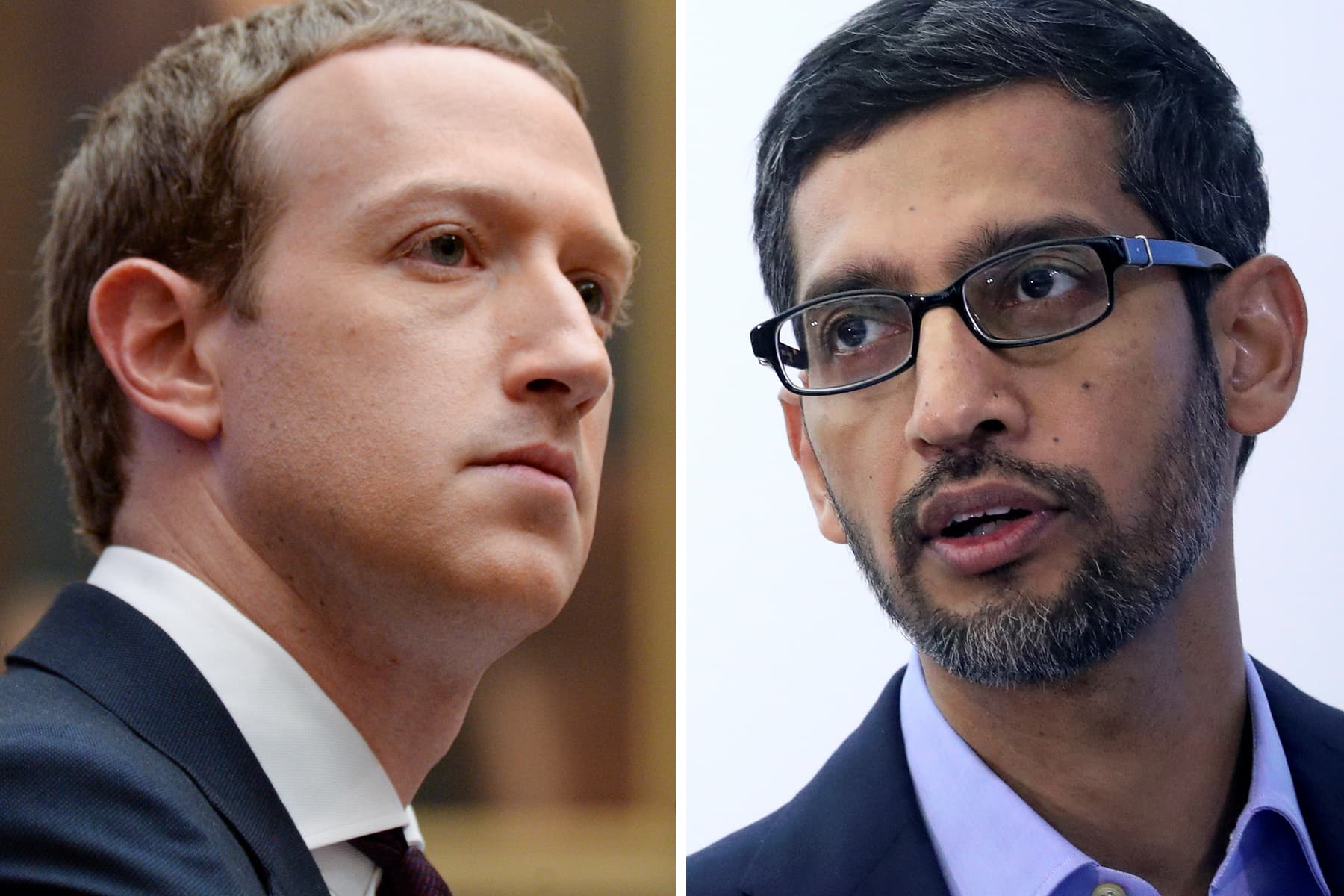
Facebook Chairman and CEO Mark Zuckerberg (L) and Google CEO, Sundar Pichai.
REUTERS
Google and Facebook’s chief executives personally oversaw an illegal 2018 deal that advantaged Facebook on Google’s ad auctions, a group of state attorneys general led by Texas allege in an amended antitrust complaint against Google on Friday.
Facebook, recently renamed Meta, is not listed as a defendant in the complaint.
The new filing shows just how far up the arrangement, alleged in earlier filings, went. Facebook Chief Operating Officer Sheryl Sandberg, whose name is redacted in the complaint, called the agreement “a big deal strategically” in an email including CEO Mark Zuckerberg, whose name was also redacted. Sandberg and Google CEO Sundar Pichai signed off on the deal’s terms, the states allege, noting Sandberg was previously a high-ranking executive in Google’s advertising business. Sandberg’s sign-off was earlier reported by The Wall Street Journal.
According to the third amended complaint in the case, Google made the deal after Facebook announced a move that would help publishers and advertisers get around Google-imposed fees for advertising through their services. The states alleged that Google feared a long-term threat to its ad server monopoly if enough buyers were able to get around its fees.
Under the agreement, Google and Facebook illegally collaborated to decrease prices paid to publishers, cut out rival ad networks and manipulate ad auctions operated by publishers, the complaint says.
An internal Facebook document quoted in the complaint allegedly said that partnering with Google would be “relatively cheap compared to build/buy and compete in zero-sum ad tech game.” Google allegedly code-named the arrangement “Jedi Blue,” referencing Facebook’s blue logo.
The group of 16 states and Puerto Rico alleged that this and other actions Google took in the online advertising space sought to illegally preserve its monopoly power, violating the Sherman Antitrust Act.
Google has previously strongly rejected the claims in the Texas-led lawsuit, with Director of Economic Policy Adam Cohen calling it in a 2021 blog post a “misleading attack.” A Google spokesperson said the company would file a motion to dismiss next week and said the case remains “full of inaccuracies and lacks legal merit.”
A Google spokesperson called states’ characterization of the Facebook arrangement inaccurate, saying, “We sign hundreds of agreements every year that don’t require CEO approval, and this was no different.”
The spokesperson added that the agreement was publicized at the time, linking to a Facebook blog post from 2018 naming Google as one of its new bidding technology partners.
Shares of Meta were up about 1% mid-afternoon on Friday while shares of Google were up about .65%.
The agreement, according to the Google spokesperson, simply allows the Facebook Advertising Network and advertisers it represents “to participate in Open Bidding, just like over 25 other partners do. That helps increase demand for publisher ad space and helps publishers earn more revenue, as we explain here.”
A Meta spokesperson said in a statement that its “non-exclusive bidding agreement with Google and the similar agreements we have with other bidding platforms, have helped to increase competition for ad placements. These business relationships enable Meta to deliver more value to advertisers while fairly compensating publishers, resulting in better outcomes for all.”
WATCH: Google faces fast and furious pace of lawsuits as antitrust scrutiny intensifies




